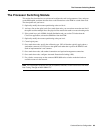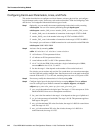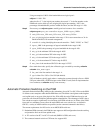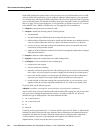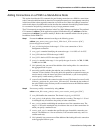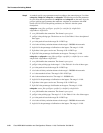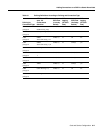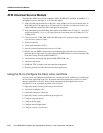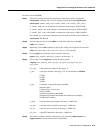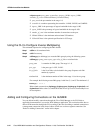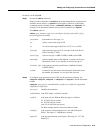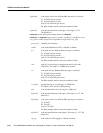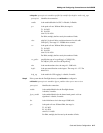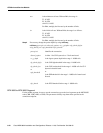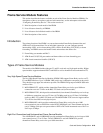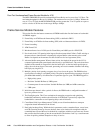
Card and Service Configuration 6-13
Using the CLI to Configure the Card, Lines, and Ports
On the CLI of the AUSM/B:
Step 1 If necessary, modify the resource partitioning for the whole card by executing the
cnfcdrscprtn command. You can view resource partitioning through dspcdrscprtn.
cnfcdrscprtn <number_PAR_conns | number_PNNI_conns | number_TAG_conns>
• number_PAR_conns is the number of connections in the range 0–1000 for PAR.
• number_PNNI_conns is the number of connections in the range 0–1000 for PNNI.
• number_TAG_conns is the number of connections in the range 0–1000 for MPLS.
For example, you could reserve 300 connections for each controller on the AUSM with:
cnfcdrscprtn 300 300 300
Step 2 Activate a physical line by using addln for each of the eight lines as needed:
addln <line_number>
Step 3 Optionally, use the cnfln command to specify line coding, line length, and clock source:
cnfln <line_num> <line_code> <line_len> <clk_src> [E1-signaling]
Step 4 Execute upport to activate the logical operation of the line:
upport <port_number>, where port_number is in the range 1–8.
Step 5 If necessary, execute cnfportq to modify the egress queues:
cnfportq <port_num> <q_num> <q_algo> <q_depth> <clp_high> <clp_low>
<efci_thres>
Step 6 If necessary, configure resources at the port level by executing cnfportrscprtn. Use
dspportrscprtn to see the current resource partitioning.
port_num is the logical port number in the range 1–8.
q_num is the queue number in the range 1–16. 0 is the default for addchan.
1=CBR
2=VBR
3=ABR
4=UBR
q_algo is a number to specify the queue algorithm:
0=disable queue
1=high priority—always serve
2=best available
3=minimum guaranteed bandwidth
4=minimum guaranteed bandwidth with maximum rate shaping
5=CBR with smoothing
q_depth is the maximum queue depth in the range 1–16000 cells.
clp_high is the high cell loss priority in the range 1–16000 cells.
clp_low is the low cell loss priority in the range 1–16000 cells.
efci_thres is the EFCI threshold in the range 1–16000 cells.



